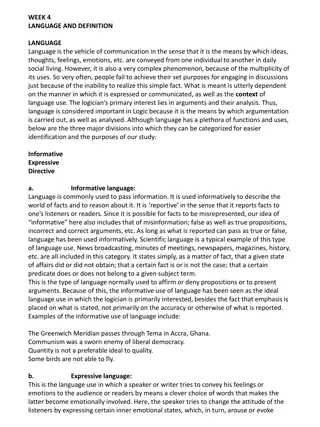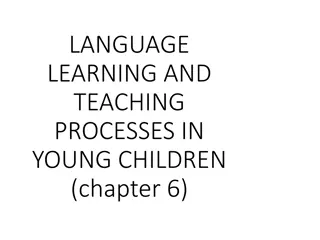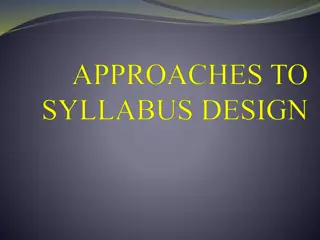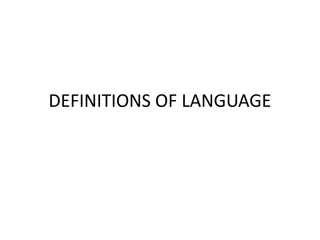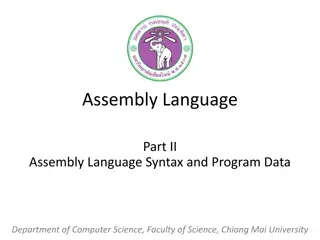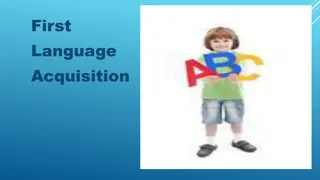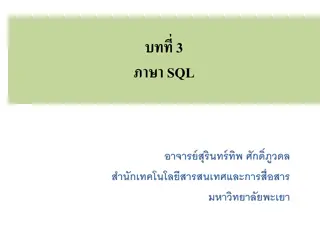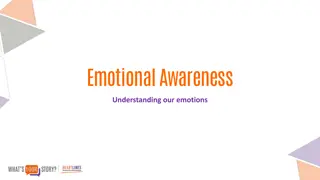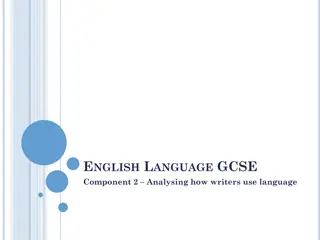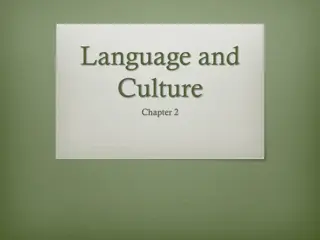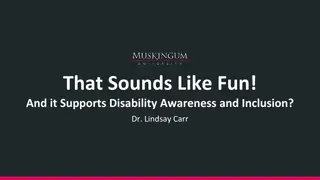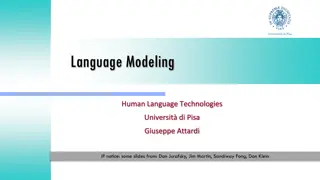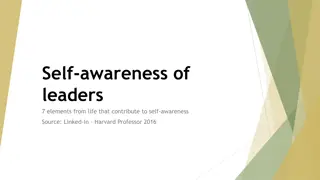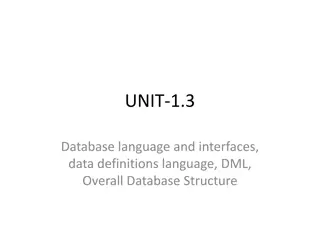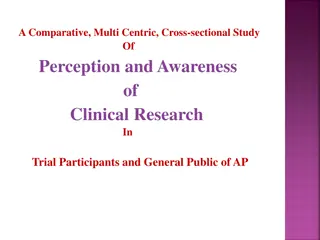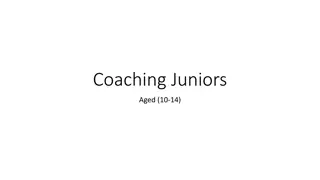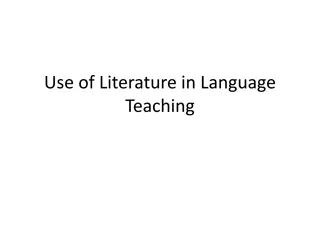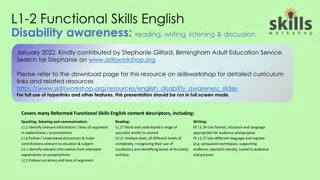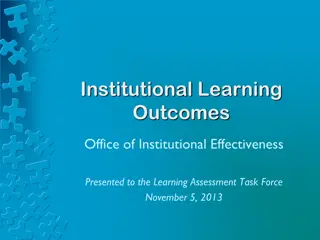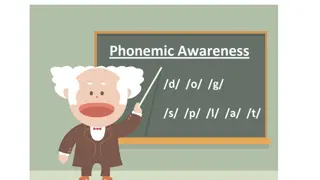Career Opportunities and Challenges in Translation & Interpreting Pedagogy Post-Pandemic
The APTIS 2022 conference explores new avenues in Translation and Interpreting (T&I) pedagogy amidst a changing landscape. Dr. Bego A. Rodriguez highlights emerging roles for T&I graduates. The context reveals a decline in language learning in the UK, impacting the Language Service Industry. The UK'
0 views • 13 slides
Language Study Community – Enhance Your Language Skills
Joining a Language Study Group is a fantastic way to take your language learning to the next level. By leveraging the power of Group Study, you can immerse yourself in the language, enhance your understanding, and build confidence in your speaking abilities. Read full article \/\/explainlearning.com
1 views • 3 slides
Academic Language Demands and Supports in Instructional Planning
Academic Language Demands and Supports are crucial in educational settings to ensure comprehension and usage of language by students. This content discusses embedding language demands in lesson plans, providing language supports, and peer review activities to enhance academic language skills. The fo
6 views • 10 slides
The Significance of Media in Language Learning
Media plays a crucial role in language learning by raising awareness of the ideology behind linguistic structures and providing valuable information on society and culture. Linguists are drawn to media language for research purposes and to understand its impact on language use and attitudes. Media s
11 views • 5 slides
Understanding Translation: Key Concepts and Definitions
Translation involves transferring written text from one language to another, while interpreting deals with oral communication. Etymologically, the term "translation" comes from Latin meaning "to carry over." It is a process of replacing an original text with another in a different language. Translat
11 views • 76 slides
Language and Communication in Society: Understanding Interactions
Explore the intricate relationship between language and society through lectures focusing on language in interaction, power dynamics, language contact and change, public space discourse, linguistic landscaping, and more. Delve into the shift from structural linguistics to societal communication, red
6 views • 28 slides
Understanding Language: Informative, Expressive, and Directive Uses
Language serves as a vital medium for communication, allowing the conveyance of ideas, thoughts, and emotions. It is a complex phenomenon with diverse uses. This text delves into the three major divisions of language use - informative, expressive, and directive. Informative language conveys facts, w
4 views • 6 slides
Language Learning and Teaching Processes in Young Children
Development of language in young children is influenced by various factors such as their cultural and linguistic environment, unique characteristics, and interactions with adults. Optimal language development requires language stimulation from the environment. Varied cultural practices impact langua
1 views • 51 slides
Understanding Language in Stoicism: Significance and Corporeality
Language in Stoicism plays a crucial role in the process of assenting to impressions by focusing on corporeality, reason, and truth. It distinguishes between the mundane vocal sounds, articulated speech, and significant language to convey meanings effectively. The significance of language lies not i
0 views • 13 slides
The Importance of Self-Awareness in Personal Growth
Self-awareness is crucial for understanding one's character, feelings, and motivations. It helps in recognizing strengths and weaknesses, managing stress, improving communication, and fostering empathy. Developing self-awareness involves introspection, mindfulness, self-reflection, and seeking feedb
2 views • 47 slides
Understanding Language Teaching Syllabus: Integration, Theory, and Approaches
Language Teaching Syllabus involves the integration of subject matter and linguistic elements, guided by theories of language and learning. Various approaches like Grammatical, Situational, Communicative, and Analytic are used to structure syllabi. Breaking language into parts aids in sequential lea
1 views • 28 slides
Exploring Language and Communication Through a Short Film
In this lesson, students will watch a 10-minute short film titled "The Most Beautiful Thing" by Cameron Covell. They will reflect on the value of learning another language, analyze how facial expressions and body language convey emotions, and develop empathy towards those facing language barriers or
0 views • 29 slides
Various Definitions of Language Throughout Linguistic History
Different linguists and scholars have offered various definitions of language over time. Sapir (1921) emphasized language as a method of communicating ideas, emotions, and desires through voluntary symbols. Bloch and Trager (1942) focused on the social aspect of language as a system of vocal symbols
1 views • 12 slides
Introduction to Assembly Language Syntax and Program Data
Learn about the syntax of assembly language and how data, variables, and constants are used in programming. Explore the basic instructions and the translation of high-level language into assembly language. Discover the role of an assembler in translating assembly language programs into machine langu
4 views • 36 slides
Enhancing Language Learning Across the Curriculum in B.Ed. 1st Year Course
Language Across the Curriculum (LAC) emphasizes that language learning should occur across all subjects, not just in language classrooms. It highlights the importance of incorporating language development into every learning activity, fostering multilingualism in schools. Language plays a crucial ro
2 views • 34 slides
Understanding First Language Acquisition Process
First language acquisition is the process through which humans develop the capacity to perceive, comprehend, and effectively use language to communicate. It primarily focuses on infants acquiring their native language. Basic requirements, caregiver speech features, and the acquisition schedule play
0 views • 19 slides
Comprehensive Overview of SQL Commands and Language Categories
In this detailed guide, you will learn about Structured Query Language (SQL) including its various commands such as Data Definition Language (DDL), Data Manipulation Language (DML), Data Control Language (DCL), and Transaction Control Language (TCL). Explore how SQL is used in Database Management Sy
0 views • 15 slides
Speech and Language Developmental Milestones: A Bilingual/Multilingual Perspective
Speech and language developmental milestones are crucial for children, regardless of their home language. These milestones encompass receptive language, expressive language, pragmatics, and articulation and phonology. Understanding how a child hears and talks from birth to one year is essential, as
1 views • 23 slides
Understanding .NET Framework Architecture and Common Language Runtime
This content delves into the intricacies of .NET architecture, highlighting its structure, common language runtime, and key components such as Common Type System (CTS) and Common Language System (CLS). It explains how .NET supports multiple languages, facilitates cross-language interoperability, and
0 views • 13 slides
Enhancing Emotional Awareness and Self-Awareness for Personal Growth
Understanding our emotions and developing self-awareness are crucial for personal growth and fostering meaningful relationships. Emotions impact various aspects of our lives, from memory and decision-making to creativity and health. Learning to recognize, regulate, and express our emotions authentic
0 views • 15 slides
Analyzing Writer's Language Use in English Language GCSE Component 2
In English Language GCSE Component 2, students learn to analyze how writers use language. The learning objective focuses on commenting, explaining, and analyzing language use with relevant subject terminology. The exam assesses students on their ability to interpret and explain a writer's thoughts,
0 views • 12 slides
Language and Culture Reflections: Diversity in Linguistic Emphasis
Exploring the correlation between language and culture, this content delves into how various languages reflect cultural values and priorities. Through examples like the Inuit language with rich vocabulary for snow and seals, the Shinzwani culture's unique word for mother and aunt, and the evolving l
0 views • 50 slides
Creating Inclusive Spaces: Muskingum University's Disability Awareness Initiatives
Muskingum University celebrates Disability Awareness and Inclusion Month by organizing a variety of events to increase knowledge and active participation. Planning begins months in advance, incorporating diverse perspectives and engaging students in the process. By involving PLUS representatives and
0 views • 14 slides
Understanding Language Modeling in Human Language Technologies
Exploring the concepts of language modeling in human language technologies, this presentation delves into N-grams, the chain rule of probability, evaluation metrics like perplexity, smoothing techniques such as Laplace, and the goal of assigning probabilities to sentences. It covers applications lik
1 views • 81 slides
The Direct Method in Language Teaching
The Direct Method, also known as the DM, emphasizes teaching the target language without translation. It aims to improve students' communication skills and focus on vocabulary and pronunciation over grammar. Teachers play a direct role in class activities, while students engage in interactive langua
0 views • 8 slides
Introduction to Language Technologies at Jožef Stefan International Postgraduate School
This module on Knowledge Technologies at Jožef Stefan International Postgraduate School explores various aspects of Language Technologies, including Computational Linguistics, Natural Language Processing, and Human Language Technologies. The course covers computer processing of natural language, ap
0 views • 27 slides
Exploring Sociolinguistics: Language Variation and Social Factors
Sociolinguistics delves into the study of language variation influenced by social factors, examining the relationship between language and its social context. It explores various aspects like standard pronunciation, language choice, speech acts, language components, language variety, and factors suc
0 views • 73 slides
Exploring Self-Awareness: Insights and Reflections on Leadership and Personal Growth
Delve into the realms of self-awareness through a journey of introspection, personal reflection, and understanding of one's emotional landscape. Discover the seven elements that contribute to self-awareness, learn from the crucible of suffering, and embrace acceptance as a tool for growth. Unravel t
0 views • 17 slides
Understanding Assembly Language Programming for Computing Layers
Assembly language is a low-level programming language that enables direct interaction with a computer's hardware components. This content explores the fundamentals of assembly language, the relationship between human-readable machine language and binary code, an assembly language program for multipl
0 views • 31 slides
Database Language and Interfaces Overview
A database management system (DBMS) requires appropriate languages and interfaces to handle queries and updates for data manipulation and control. This includes Data Definition Language (DDL), Data Manipulation Language (DML), Data Control Language (DCL), and Transaction Control Language (TCL). Each
0 views • 12 slides
Perception and Awareness of Clinical Research in Trial Participants and the Public of Andhra Pradesh
This study focuses on understanding the perception and awareness of clinical research among trial participants and the general public in Andhra Pradesh. It highlights the importance of creating awareness about clinical research, previous study results, public attitudes towards clinical trials, and e
0 views • 24 slides
Understanding Language Anxiety in Foreign Language Learning and Teaching
Explore the impact of language anxiety on students and teachers in foreign language learning and teaching contexts through insights from Dr. Christina Gkonou's research. Delve into the theoretical background, implications for language education, and real-life experiences shared at the Essex Language
0 views • 25 slides
Strengthening Language Rights: Official Languages (Amendment) Act 2021
The Official Languages (Amendment) Act 2021, enacted to strengthen the language rights of Irish speakers, introduces provisions for public bodies' communications in official languages. Section 10A requires public bodies to allocate a minimum of 20% of advertising in Irish and 5% of ad expenditure in
0 views • 49 slides
Understanding Language Development in Children with Assistive Technology
Explore the nuances of speech vs. language development in children, focusing on the benefits of using alternative language modes such as signs, pictures, and gestures. Delve into the definition of language and speech, set the stage for discussions around assistive technology, and learn about the imp
0 views • 40 slides
Coaching Juniors Aged 10-14: Developing Tactical Awareness in Badminton
Introduction to coaching philosophy for junior players aged 10-14, emphasizing hard work, team work, embracing failure as a learning opportunity, and understanding variables outside of one's control. The course covers topics such as tactical awareness, planning, and technique development. Assumption
0 views • 42 slides
Exploring Literature in Language Teaching
Literature plays a significant role in language teaching as it offers authentic materials, motivates learners, and enhances cross-cultural awareness. Literary works help develop language skills and critical thinking while providing insights into cultural aspects and artistic expressions. Various app
0 views • 27 slides
Understanding Ableism and Challenging Ableist Language
Ableism is a form of discrimination favoring able-bodied individuals over disabled people. This resource explores the concept of ableism, the impact of language on the disabled community, and strategies to combat ableist language. It covers key vocabulary, shocking statistics on disability discrimin
0 views • 6 slides
Mesa Institutional Learning Outcomes Overview
Mesa's Institutional Learning Outcomes (ILOs) focus on core values such as communication, critical thinking, global awareness, personal awareness, civic responsibility, self-awareness, interpersonal skills, and technological awareness. These outcomes are designed to guide students in acquiring essen
0 views • 13 slides
Enhancing Situational Awareness for Home Visit Safety
Situational awareness is crucial for observing and being attentive to your surroundings to prevent accidents and errors. Understanding different levels of situational awareness, from a relaxed alert state to an active threat response, can significantly improve safety and decision-making in everyday
0 views • 14 slides
Dispelling Myths About Phonemic Awareness in Reading Instruction
Professional development and teaching strategy resources are more effective than specialized phonemic awareness materials. It is essential to integrate phonemic awareness into real reading and writing contexts, rather than teaching it in isolation. Research suggests that the optimal time range for p
0 views • 16 slides






